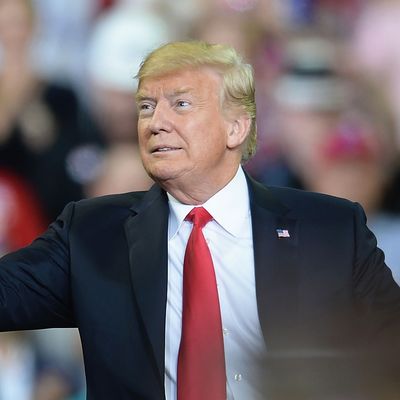
Donald Trump won the Republican nomination because he outflanked his opponents to the right on social issues. But he won the general election in part by beating his opponent to the center. Unlike Hillary Clinton, who was perceived as staunchly liberal, voters saw Trump as moderate. Trump was perceived as more moderate or liberal, and less conservative, than any Republican nominee since at least Ronald Reagan:
In office, he has instead governed as an orthodox right-winger. This explains why Trump has lost so much of his nonconservative support. But it also helps explain the Republican Party’s willingness to defend him. Instead of keeping his popular promises that helped get him elected, Trump instead adopted the unpopular stances of the conservative movement, which has in turn embraced him.
Bobby Jindal, who used to be the future of the Republican Party and has instead settled for a life of writing periodic testaments to the man who took his place, surprisingly confirms this damning account in his latest paean to the president. Jindal, of course, does not frame the story of Trump’s broken promises in a negative way. Instead, writing under the headline “Why Republicans Stick With Trump,” he presents Trump’s flip-flops as the conservative movement’s well-earned reward.
For instance, Jindal notes that Trump abandoned his popular fiscal promises to raise taxes on the rich and invest in a yuge infrastructure build-out. Instead, he did neither:
During the election, Mr. Trump promised a $1 trillion infrastructure plan. Some Republicans feared his first initiative on taking office would be a pork-laden spending package reminiscent of Barack Obama’s stimulus bill. They also worried he would cut a deal with Democrats to raise taxes. “I am willing to pay more,” Mr. Trump said in May 2016. “And do you know what? The wealthy are willing to pay more.” Instead, the reverse happened: There’s no infrastructure plan in sight, except for the border wall, and Mr. Trump signed a sweeping bill to reduce personal and corporate taxes.
The voters don’t approve of this choice. (Indeed, the tax cut is so unpopular Republicans in Congress barely mention it at all.) But Trump’s decision to lavish a massive tax cut on business owners has paid off in overwhelming institutional support from the conservative movement.
Likewise, as Jindal admits, Trump constantly promised to take care of people who couldn’t afford to buy insurance, and to stick it to drug companies, and then in office, decided not to:
In 2015, candidate Trump told “60 Minutes” that his plan would provide universal health coverage paid for by the government. “I am going to take care of everybody,” he said. Campaigning in New Hampshire a few months later, he said Medicare could save an unrealistic $300 billion if the government negotiated with drug companies to lower prices. But as president, Mr. Trump has pursued more-conventional Republican policies, such as adding work requirements to Medicaid, expanding short-term insurance plans, and broadening association health plans.
Trump’s health-care positions have been even more unpopular than his tax positions. But again, it has brought the payoff of total institutional support. The U.S. Chamber of Commerce, which previously supported West Virginia senator Joe Manchin as a token gesture of bipartisanship, just endorsed his Republican opponent, Patrick Morrisey. Manchin is still favored to win, and the Chamber’s willingness to support an underdog (and hence risk alienating a potential sympathetic ear) underscores how much the big business lobby is prioritizing Republican control over having influence with individual members.
And Trump needs that support. He is massively corrupt and wildly vulnerable on an ever-expanding number of legal fronts. If the Republican Congress engaged in minimal oversight, even just relenting to Democratic demands to look at his tax returns so the public could know who was paying him directly, Trump would be in serious trouble. Instead, they are all in on protecting Trump from exposure or legal accountability.
Congressional Republicans are taking a big risk by tying their fortunes to an unstable personality who might inflict long-lasting brand damage to their party. But Trump is also taking a big risk by jettisoning the popular promises that got him elected. That trade may not be an explicit deal. But, as Jindal notes, conservatives are definitely getting a return on their investment.































